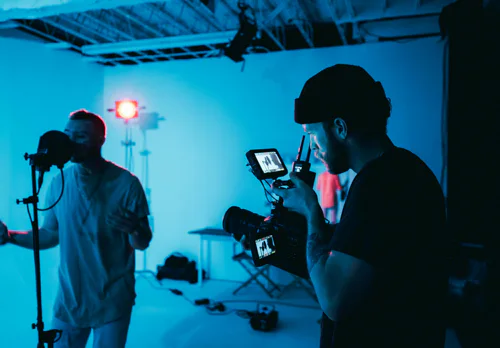Your stepping stone as a bit player
Do you like stepping into different roles, want to be in the spotlight and inspire other people? But you are not a trained, professional actor?
No problem, because TV, film, theater, advertising and events are also looking for amateur actors ("people") who have a talent for acting and ideally have had some experience in front of the camera or on stage. Bit-part actors are given short passages of text that they have to memorize and later perform flawlessly.
Many people aspire to become bit- player actors, as not only do they receive a higher salary than extras, but with enough training and experience, they can even make it as an actor. So if you can put yourself in other people's shoes and are confident with your lines, you have a good chance of becoming a bit-part actor.
Extras, background actor and bit player - what's the difference?
Extras, background actors and bit player - they are all indispensable for the entertainment industry, as they bring the respective scenes to life. They move around in the picture, sometimes inconspicuously, sometimes visibly, going about their staged activities. But it is precisely this seemingly disorganized hustle and bustle that creates an authentic image that lends the action a "real" character.
Extras as well as background actors and bit players are summarized under the term amateur actors, as they are ordinary actors who are not professional actors and have not completed any acting training. Although they may be experienced due to several previous jobs, they are never equated with actors.
Extras and background actors mainly stay in the background and interact with the anonymous crowd. Minor actors, on the other hand, are in the foreground and play individual roles alongside the main actor. They are more strongly integrated into the plot (e.g. of a movie or series), but they only appear briefly and then disappear again. In most cases, they are given a verbal role.
The Allianz Deutscher Produzenten - Film & Fernsehen e.V. defines bit-part actors as follows:
Small-scale actors are film and television professionals who are engaged in the production of a film or television production in the field of small-scale acting and whose acting participation does not significantly carry the filmic plot and does not give it its own personal imprint. This is to be assumed if the script does not provide for (a) a longer speaking part and (b) a longer change of words or reactions.
What do bit player actually do?
As soon as the director has given his final instructions and the clapperboard has closed, the previously deserted schoolyard is transformed into a wild playground in the RTL series "The Teacher", or the empty highway into a confusing accident scene in the action series "Alarm for Cobra 11". Small-time actors mingle with the hustle and bustle. Each one has their own role.
There are two different levels of bit player - the upscale bit-part actors and the high-class bit player. Both terms are briefly explained in the next two sections.
The "upscale small-scale performance" includes the participation in the action in the foreground or background, whereby the small-scale actor does not have a longer verbal or non-verbal exchange of words or reactions with the actor. However, he is emphasized as a single special type (features extra), with possible use of text.
The "high-class bit-part actor" means that, as above, the bit-part actor does not have any longer exchanges of words or reactions with the actor, but appears repeatedly throughout the entire play. However, the text assigned to them is at most a few sentences.
Minor actors can also be used as so-called light doubles (further designations: Test Candidates, Rehearsal Candidates, Stand-Ins, Straw Candidates) during rehearsal days for major TV shows and events. They stand in for the real stars, jury members or candidates when they light up. This is because sequences have to be rehearsed and the technology set up correctly. This is why the lighting doubles are usually the same size and shape as the main actors and wear the same clothes. This is how the recordings for the TV shows "Die Höhle der Löwen" (VOX) or "Mein Mann kann" (SAT.1) were created.
Industries in which bit-part actors find employment:
Film & television
Theater, musicals and opera
Advertising and web
music
What skills do bit player have?
Now the question arises: who can actually become a bit-part actor? But there are no limits to this activity - acting enthusiasts of all ages and genders, regardless of their appearance, nationality or ethical background. They can all do it.
The only requirement: bit player must be talented actors and have a good command of their lines. At best, they have already taken acting lessons and/or have gained initial experience as an extra or bit-part actor (with lines).
Other talents, such as singing, dancing and foreign languages, are not essential, but are advantageous, as they make you more versatile and can increase your chances of getting involved.
Patience is another virtue that a bit player should master. Not only on set and during rehearsals, but also during the application process and when being placed by the agency.
Is training necessary?
Training is not necessary. However, it can't hurt to take acting lessons or take part in workshops, as the skills you learn will make you more professional in your dealings with future clients.
What do you earn as a bit player?
You can't expect insane sums as a bit-part actor because, as with actors, the fee in the film and television sector is regulated by the collective agreement.
In addition, the fee always depends on the production, how much camera time you have and how extensive the texts are. The fee for a small actor can therefore range between € 180 and € 800.
In addition, bit player receive supplements for bringing their own smart clothing, e.g. tails, cocktail dress, fur coat and other props (e.g. skateboard, sledge). Additional allowances are paid if the bit player has to spend more than a temporary period outside in unsuitable clothing (e.g. ski outfit in summer), for small speaking roles, due to night work, work on Sundays and public holidays and overtime. Expense allowances may be paid for elaborate costume fittings, travel costs and overnight stays.
What development opportunities does a bit player have?
Bit player are usually ambitious artists who enjoy acting and take it more seriously than extras, for example. One reason for this is that they invest more time in preparation (e.g. previous extras assignments, acting lessons, auditions). On the other hand, a higher level of acting ability is required of them.
It is therefore quite possible that bit player- as the name suggests - start out "small" in order to gain as much experience as possible, practise and improve so that they are well prepared for larger acting roles later on. This is particularly popular with drama students, but also for amateurs who want to develop personally.
Bit player can also become successful internationally. You can also apply for German-speaking engagements in Switzerland and Austria or venture across the pond to America, for example.























